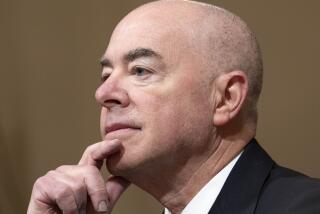Lithuanian Lawmakers Vote to Impeach President
- Share via
MOSCOW — Lithuanian President Rolandas Paksas was removed from office Tuesday for his support of a businessman with alleged links to Russian organized crime, leaving the Baltic republic in political upheaval on the eve of its entry into the European Union.
In a close vote, members of Parliament approved the impeachment of the 47-year-old former stunt pilot, who acknowledged “mistakes,” but insisted that he was a corruption-fighter and victim of “a system that ... is more powerful than you can imagine.”
Parliament Chairman Arturas Paulauskas was appointed acting president pending new elections, which will probably be held in June, when Lithuanians also will select their first representatives to the European Parliament.
“I do not feel any great personal joy over this,” Paulauskas told reporters. “You can say only that justice has been served, and justice has triumphed.”
The vote appeared to mark the first time a European head of state has been removed by impeachment. But political leaders said the nation, which regained independence with the collapse of the Soviet Union, had successfully weathered a crucial trial of its democratic institutions.
“The impeachment procedure ended today the way it is supposed to end in any genuinely democratic country -- the president has been removed from office after committing such grave offenses,” former head of state Vytautas Landsbergis, now a conservative member of Parliament, said in a telephone interview.
“The impeachment is a test, it is a great ordeal for Lithuania’s democracy,” Landsbergis said. “Today we know that the ordeal is over, and we have passed the test.”
Paksas, who addressed Parliament on Monday and Tuesday as hundreds of his supporters chanted outside, denied any serious wrongdoing and blamed the impeachment on his battle with political foes.
“I am convinced that this scandal would not have erupted if my advisors and I had not attempted to destroy the corrupt system,” Paksas said. “I do not deny my mistakes,” he said, but he added that “none of them was serious enough to cause damage to Lithuania.”
Two of the three charges on which the president was impeached involved his relationship with Russian businessman Yuri Borisov, who police assert has ties to Russian organized crime figures. Borisov contributed $400,000 to Paksas’ election campaign in 2003, when he won an upset victory over incumbent Valdas Adamkus.
The Constitutional Court concluded last week that Paksas “grossly violated” the constitution by granting Lithuanian citizenship to Borisov and warning him that he was under surveillance by state security services.
A total of 86 deputies voted for impeachment on each of those counts. A third count, charging Paksas with interfering in a privatization deal “in favor of persons close to him,” gained votes from 89 deputies.
A total of 85 votes from the 137 sitting members of Parliament were necessary for impeachment.
Under Lithuanian law, new presidential elections must be held within a little more than two months. Paksas theoretically could be a candidate for his old job, but would be prohibited from running if he wound up facing criminal charges.
Aloyzas Sakalas, chairman of Parliament’s legal affairs committee, said it would be up to the state prosecutor to decide on criminal charges.
“There obviously are some grounds to at least launch a probe of the president’s actions,” he said in an interview. But he said removing him from office was the most important response.
“Paksas needed to be punished for having breached the constitution, and he has been -- he is out of office now,” Sakalas said. “He could not be allowed to get away with it.”
Parliament leaders said the impeachment was likely to increase the confidence of European leaders in Lithuania as it prepares to join the European Union.
The country became one of the newest members of the North Atlantic Treaty Organization late last month.
By law, the Lithuanian president holds sway mainly over foreign policy, while the prime minister runs the government.
Ex-President Adamkus is seen as a possible right-wing candidate in the elections, though 77. Algirdas Mykolas Brazauskas has been mentioned as a potential representative of the social democrats and social liberals, the two parties that hold the majority in Parliament.
Alexei V. Kuznetsov of The Times’ Moscow Bureau contributed to this report.
More to Read
Sign up for Essential California
The most important California stories and recommendations in your inbox every morning.
You may occasionally receive promotional content from the Los Angeles Times.













